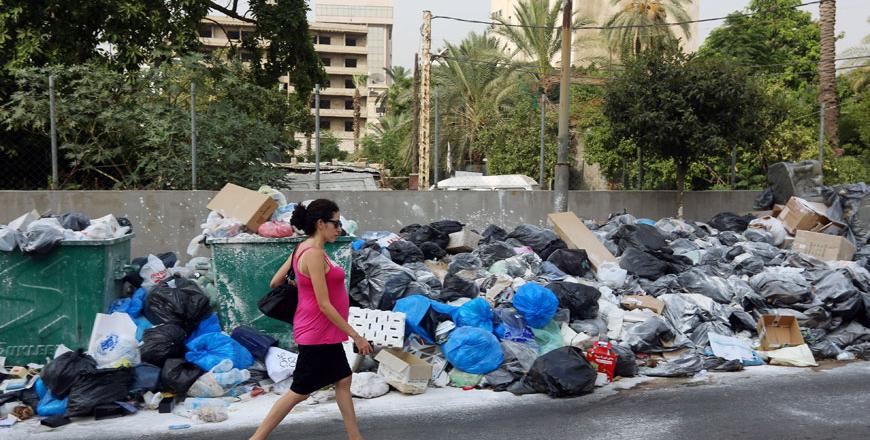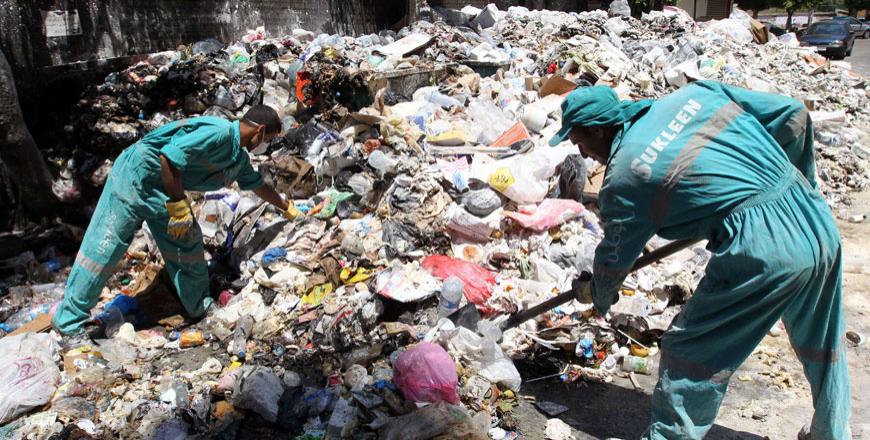You are here
Lebanon’s trash crisis worsens amid rising heat, anger
By AP - Aug 03,2015 - Last updated at Aug 03,2015

A Lebanese woman walks past a pile of garbage covered with white pesticide in Antelias, north of Beirut, Lebanon, on Monday (AP photo)
BEIRUT — It's summer in this proud Mediterranean city, with celebrities and Lebanese expats flocking to international festivals and parties at Beirut's beaches and nightclubs. But the country's own citizens are suffocating from mountains of stinking garbage collecting on the streets — yet another reflection of government paralysis and its inability to find a solution for the capital's rubbish.
Lebanon has enjoyed relative calm amid the violence afflicting neighbouring countries in the past few years. Despite a massive influx of Syrian refugees and occasional outbursts of sectarian clashes, Beirut has largely survived the regional upheaval, even if its politicians have been locked in internal disputes, unable to agree on a new president for more than a year.
But the country's politics caught up with it in the past two weeks after authorities permanently closed down Beirut's main landfill. The Naameh landfill, south of Beirut, had already been kept open for a year beyond its planned closure, in hopes that the government would find an alternative. It did not.
When the landfill closed July 17, Lebanon's notoriously gridlocked government again failed to take action, leaving piles of smoldering rubbish baking in the sun in the streets of Beirut and its suburbs.
It came amid the busiest time of year in Beirut. International stars such as singer Charles Aznavour, soprano Anna Netrebko and jazz musician Richard Bona are performing at Lebanon's famed summer festivals, and bars and beaches are at full capacity. Partygoers sidestep rotting garbage on the way to bars at Lebanon's famous Gemayzeh street.
As temperatures rise and the country's infamous electricity cuts worsen, the sweltering heat and the stinking, rotting garbage is provoking an outcry from Beirut's 2 million residents.
"It is a scandal, and what is even a bigger scandal is the politicians who don't feel the need to resign," said Paul Abi Rached, the head of the Lebanese Eco Movement.
During a 10-day stoppage, the fumes got so bad that some residents donned surgical masks against the stench. Piles of trash grew on streets, sidewalks and near building entrances.
Lebanon's commercial centre, with its beautifully restored Ottoman-era buildings and new lavish apartments, has been spared the piles of garbage for now, with most of the trash being taken to an empty lot and covered with a plastic tarp.
Lebanon's waste management company Sukleen resumed random collection on small scale, taking trash to two temporary landfills, including one near Beirut International Airport. But those have started to fill up. Nearby municipalities have refused to accept Beirut's garbage.
Meanwhile, some people have taken to paying for private pickup truck owners to collect the garbage in front of their homes, who dump it at night in unknown locations. The country has long lacked recycling services or even basic trash sorting, exacerbating the problem.
Abi Rached said garbage is spreading to natural reserves, rivers and valleys and local leaders are resorting to tactics that were common during the 1975-90 civil war.
"It's gotten to a point where people are digging up pits and burying the trash," he said.
Workers are dousing the rubbish with lime powder and pesticide to knock back the smell and the spread of pests. Some people burn trash on the street, sending a brown, toxic haze wafting over the city's horizon.
"It is my duty to warn of the extensive health perils that may result from the current situation," Health Minister Wael Abou Faour said at a press conference Monday. "We don't have the luxury of time or waiting."
He said he was sounding the alarm after random landfills have started to reach full capacity, including the dump site near Beirut's airport. That has drawn warnings from the public works minister, who said the trash poses air safety risks because of smoke and birds flying over the pit.
Germany has offered to export Lebanon's trash by sea — an offer the government said it was studying along with proposals for long-term solutions such as garbage incinerators and developing new landfills.
But it does not seem to be in a hurry, postponing the issue from one cabinet meeting to the next.
The government has long been criticised for failing to take action on Lebanon's antiquated infrastructure — a symptom of the country's dysfunctional sectarian power-sharing system that often leads to paralysis.
The civil war in neighbouring Syria and its 1.2 million-plus refugees now living in Lebanon have made the situation worse.
Despite a public outcry, very few have taken to the streets in protest. In typical Lebanese style, life has gone on, uninterrupted. But the situation may change as anger on the street mounts.
"Shame on them [politicians] and shame on us if we accept to live like this," businessman Antoine Samaha said. His family was seriously considering taking his mother, who has asthma, to live with his brother in Paris. "Every decent Lebanese should protest this situation."
Related Articles
BEIRUT — Lebanon's government is so dysfunctional, Beirut stinks.
BEIRUT — Trash collection resumed in Lebanon's capital Beirut after an almost week-long crisis that has seen streets overflowing with waste
BEIRUT — Police in Beirut clashed with anti-corruption demonstrators trying to break through barbed wire protecting Lebanon's parliament on

















